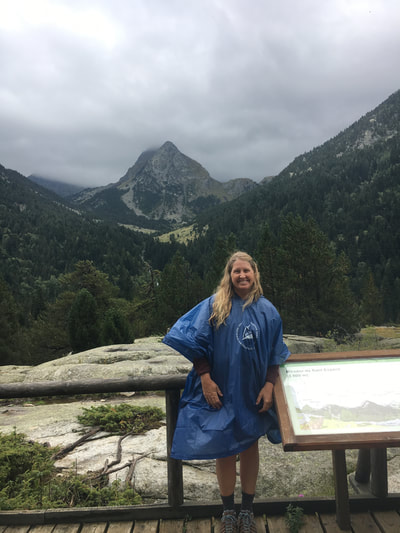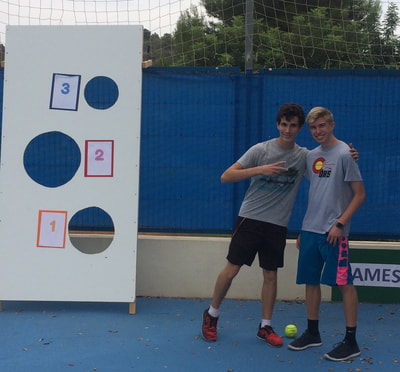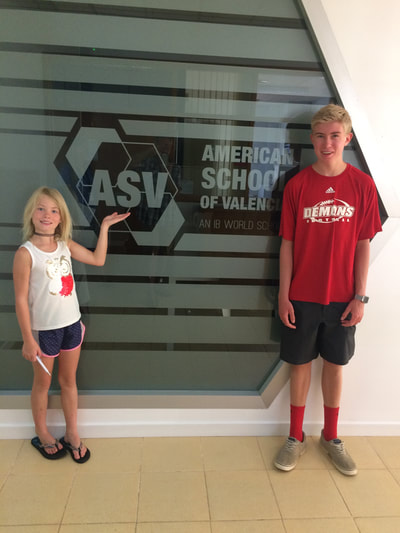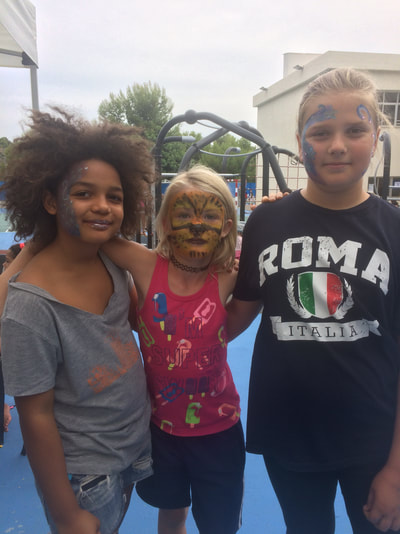|
It's one thing to imagine your child being immersed in a new culture for a year, it's another to actually see it happening. To leave the comforts of friends they have known for the entirety of their short lives, a system they understand, sports they have chosen and practiced, and an identity they have developed is a big step. Luckily, both of our kids were excited about the challenge, so we didn't have to force them to do it. That is an important place to start because reality is never the same as expectations. After a month into a new school and way of life, I still feel we have made the right decision. It may be hard at times, but even the difficulty is helping them to develop several major life skills: self assuredness, flexibility, compassion, and a global perspective. However, to achieve these, both have their own unique paths to follow. My high school son has adjusted well to his new school, mostly because of his two primary personality traits: independence and humor. His major challenge was getting around the lack of material goods in Spain. No matter where you look, either online or in stores, there are only about 3 kinds of folders and notebooks, as opposed to the hundreds of choices in the United States. This applies to almost everything, from sports shoes to technology. It is a good lesson for him to learn to "make do" and be flexible based upon what is available where you live. Other than that, he has quickly made friends and enjoys meeting people from all over the world. My analysis of the ease in which he has adjusted are based upon the following conclusions:
Our third grade daughter, Celia, however, has experienced a different kind of culture shock connected with being a female in Spain that took us all by surprise. When we went to the school orientation many expat women told me to expect the girls to be "horrible" to Celia and the moms to be "horrible" to me. They explained that there is a very strict hierarchy among Spanish women, which translates to their daughters. Obviously, their daughters had had bad experiences and many of the parents had developed an "us vs them" mentality around the Spanish girls and moms. I really had no idea what they were talking about and shrugged it off, knowing that Celia makes friends easily as long as she has the opportunity to run and play imaginary games. All the kids at the school get to sign up for one extra curricular activity as part of their school day. Celia picked soccer because she loves it, and, hey, we're in Spain. She thought she would have a great group of soccer team mates to get to know. It turned out that she was the only third grade girl that signed up. All the other girls did some kind of dance or opted out. She also found that at recess, the girls practiced their dances, talked about boys, and didn't really play any games. She experienced a lot of typical clique behavior, such as girls asking her to sit somewhere else, telling her she couldn't be with them, or not having anyone to eat lunch with. But, on top of this, the Spanish girls switched to Spanish every time she approached to try and keep her out of the group. Other than Celia, there is only one other boy named Braxton who is new and non-Spanish, so she only had hm to talk to. At first Celia was sad and lonely. As a Mom, it breaks your heart and I questioned our decision to put her in this situation. But, this story is on its way to a happy ending. Celia loves her teacher and Spanish teacher, so I told her to focus on that. And, rather than try to push her way in to the groups of girls, I told her to just be self sufficient, enjoy what she can, and not to be afraid to ask someone to repeat something to her in English. I also told her that rather than get angry at these girls and burn bridges, just spend some time observing how people are different here. So, she quit trying so hard and just accepted the situation. She and Braxton started playing tag at recess since neither of them had anybody else to play with. Then, two things happened that have made all the difference. If they were one year older it might not have worked, but in third grade, many of these girls really want to act like kids, despite the social stigma not to. So, slowly, some of the girls and boys started asking if they could play tag, too. Now there is a big group that plays every recess. It is a completely new game for them. The second thing is something that I will forever be grateful for. One Spanish girl named Ailen saw how Celia was being excluded and asked Celia to eat with her at lunch. That one person is all it took to make Celia excited to go to school. It is a reminder that when it comes to group dynamics, it only takes one brave person to break from the herd. Once one person does it, it opens the door for others. I hope Celia will remember this experience the rest of her life and be brave enough to reach out to others in the same way that Ailen reached out to her. As for soccer, she stuck with it. She now has what all the other girls are really after - attention from the boys. The boys have embraced Celia as a team mate and chant her name (they pronounce it "Thalia") whenever she does something well. She is out there with them screaming "pasa pasa" like all the others. So, while the other girls talk about the boys, Celia actually plays with them. She is somewhat of an anomaly and I can tell she feels proud. When any culture comes in contact with another there are bound to be misunderstandings and feelings of distance. However, sometimes it takes one person to bridge the gap, as well as the time to understand why people act the way they do. Celia will take many life lessons home with her, as well as an appreciation for the wider range of what is acceptable for girls in the United States. However, her time here may make an impact on her new friends as well. When she leaves, some of the girls may continue playing tag, a few may join the soccer team, and they may be more willing to reach out sooner to someone that is outside their social hierarchy. After doing it once, they may realize it was worth it.
2 Comments
Ailen
10/12/2017 11:45:50 am
Love it
Reply
Sherron
10/12/2017 10:00:02 pm
Terrific blog - so interesting and clearly expressed. I'm so proud of my grandchildren for their adaptability. It helps that they have a fun, loving family to come home to. Sally, I always thought you were a psychologist. This blog is another example.😊❤️
Reply
Leave a Reply. |
AuthorSally and her family moved to Spain for a year from July 2017 - July 2018. They lived in a little town called Puzol, which is about 20km north of Valencia. Her kids, Carson and Celia, attended the American School of Valencia, an International School located in Puzol. The goal for the whole family was to experience another way of life, and learn Spanish. Archives
May 2018
topics |
contact
|








